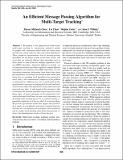An Efficient Message Passing Algorithm for Multi-Target Tracking
Author(s)
Chen, Zhexu (Michael); Chen, Lei; Cetin, Mujdat; Willsky, Alan S.
DownloadWillsky_An efficient message.pdf (2.121Mb)
PUBLISHER_POLICY
Publisher Policy
Article is made available in accordance with the publisher's policy and may be subject to US copyright law. Please refer to the publisher's site for terms of use.
Terms of use
Metadata
Show full item recordAbstract
We propose a new approach for multi-sensor multi-target tracking by constructing statistical models on graphs with continuous-valued nodes for target states and discrete-valued nodes for data association hypotheses. These graphical representations lead to message-passing algorithms for the fusion of data across time, sensor, and target that are radically different than algorithms such as those found in state-of-the-art multiple hypothesis tracking (MHT) algorithms. Important differences include: (a) our message-passing algorithms explicitly compute different probabilities and estimates than MHT algorithms; (b) our algorithms propagate information from future data about past hypotheses via messages backward in time (rather than doing this via extending track hypothesis trees forward in time); and (c) the combinatorial complexity of the problem is manifested in a different way, one in which particle-like, approximated, messages are propagated forward and backward in time (rather than hypotheses being enumerated and truncated over time). A side benefit of this structure is that it automatically provides smoothed target trajectories using future data. A major advantage is the potential for low-order polynomial (and linear in some cases) dependency on the length of the tracking interval N, in contrast with the exponential complexity in N for so-called N-scan algorithms. We provide experimental results that support this potential. As a result, we can afford to use longer tracking intervals, allowing us to incorporate out-of-sequence data seamlessly and to conduct track-stitching when future data provide evidence that disambiguates tracks well into the past.
Date issued
2009-08Department
Massachusetts Institute of Technology. Department of Electrical Engineering and Computer Science; Massachusetts Institute of Technology. Department of Mechanical Engineering; Massachusetts Institute of Technology. Laboratory for Information and Decision SystemsJournal
Proceedings of the 12th International Conference on Information Fusion, 2009. FUSION '09
Publisher
Institute of Electrical and Electronics Engineers (IEEE)
Citation
Zhexu Chen, et al. "An efficient message passing algorithm for multi-target tracking" 12th International Conference on Information Fusion, 2009. FUSION '09. ©2009 ISIF
Version: Final published version
ISBN
978-0-9824-4380-4